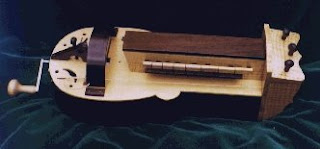 I finally overcame my aversion for classical singing : ) I think the key factor was the realisation of the importance of the lyrics, without which the songs often sound like empty gargles to me.
I finally overcame my aversion for classical singing : ) I think the key factor was the realisation of the importance of the lyrics, without which the songs often sound like empty gargles to me.I went to the Oxford Lieder Festival to hear Florian Boesch (bass baritone) and Andrew West (piano) play Schubert's Die Winterreise ("The Winter Journey"), composed in 1827, one year before his death at age 31. It is based on a cycle of 24 poems written by the (also short-lived) poet Wilhelm Müller (1794-1827).
The organizers had the presence of mind to distribute the full text of the poems, and I followed them closely during the entire concert. I only looked at the stage occasionally to see Boesch's raging face, which would have scared the most pitiless murderers. The story of Winterreise is about a man that has to leave the house of his fiancée -- for an unknown reason (the pre-concert speaker mentioned something about her getting married to a rich man...) -- and shouts out his anger and sadness as he wanders across wintry landscapes. He's going through a succession of phases from deep despair to vain attempts at cheering up, from a sparkle of hope to impatience for death. His journey finally leads him to a graveyard, but he's pissed off not to find an unoccupied grave and keeps on walking against the snow storm in an outburst of nihilist courage :
Lustig in die Welt hinein
Gegen Wind und Wetter !
Will kein Gott auf Erden sein,
Sind wir selber Götter !
The two last songs then appear as mysterious epilogues :
xxiii. Die Nebensonnen
Drei Sonnen sah ich am Himmel stehn,
Hab' lang' und fest sie angesehn ;
Und sie auch standen da so stier,
Als wollten sie nicht weg von mir.
Ach, meine Sonnen seid ihr nicht !
Schaut Andren doch in's Angesicht !
Ja, neulich hatt' ich auch wohl drei ;
Nun sind hinab die besten zwei.
Ging' nur die dritt' erst hinterdrein !
Im Dunkeln wird mir wohler sein.
xxiv. Der Leiermann
Drüben hinter'm Dorfe
Steht ein Leiermann
Und mit starren Fingern
Dreht er, was er kann.
Barfuss auf dem Eise
Wankt er hin und her ;
Und sein kleiner Teller
Bleibt ihm immer leer.
Keiner mag ihn hören,
Keiner sieht ihn an,
Und die Hunde knurren
Um den alten Mann.
Und er lässt es gehen
Alles, wie es will,
Dreht und seine Leier
Steht ihm nimmer still.
Wunderlicher Alter,
Soll ich mit dir gehn ?
Willst zu meinen Liedern
Deine Leier drehn ?

The picture shows a "Leier" ("vielle à roue" in French ; I remember my grandfather use to have one of those instruments that always fascinated me). In this last song, I understand it as a symbol of an implacable periodic cycle that transcends men's miserable finiteness. The organ-player looks weak and insane, an outcast, but it is the disguise of ultimate wisdom, whose concern is stretching beyond death.
The lover's misfortune should not be taken too literally but rather as an illustration of a more universal departure from a state of being where meaning was god-given (some sort of Garden of Eden) towards an absurd world depraved of unquestionable foundations (the speaker had presented Schubert as a predecessor of Nietzsche...). After having gone through all stages of despair, touching the bottom in the graveyard, he finds an unexpected solution : although life has lost the a priori meaning it use to have in more rudimentary periods, it is still possible (and necessary) to make sense of it by its representation in the arts [and sciences], and in particular music. The Leiermann is a symbol of the lover's creative drive.
The 24 songs properly form a cycle in the sense that they themselves are the response to the last question : "Willst zu meinen Liedern / Deine Leier drehn ?" By listening to them the empathic audience has participated in their transfiguration by acknowledging and validating their representational power.

No comments:
Post a Comment